标签:row tor 赋值操作符 des col roo 完成 desktop main函数
下面的复数解决方案是否可行?
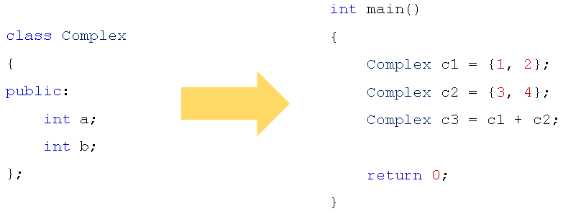
示例1——原有的解决方案:
#include <stdio.h>
class Complex
{
int a;
int b;
public:
Complex(int a = 0, int b = 0)
{
this->a = a;
this->b = b;
}
int getA() { return a; }
int getB() { return b; }
friend Complex Add(const Complex& p1, const Complex& p2);
};
Complex Add(const Complex& p1, const Complex& p2)
{
Complex ret;
ret.a = p1.a + p2.a;
ret.b = p1.b + p2.b;
return ret;
}
int main()
{
Complex c1(1, 2);
Complex c2(3, 4);
Complex c3 = Add(c1, c2); // c1 + c2
printf("c3.a = %d, c3.b = %d\n", c3.getA(), c3.getB());
return 0;
}运行结果为:
[root@bogon Desktop]# g++ test.cpp
[root@bogon Desktop]# ./a.out
c3.a = 4, c3.b = 6操作符重载:
通过operator关键字可以定义特殊的函数
operator的本质是通过函数重载操作符
语法:
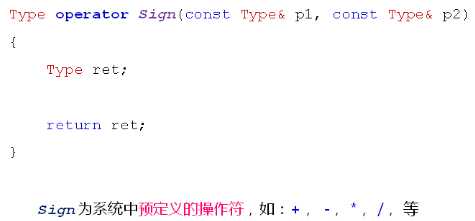
示例2——使用操作符重载函数代替原有函数:
#include <stdio.h>
class Complex
{
int a;
int b;
public:
Complex(int a = 0, int b = 0)
{
this->a = a;
this->b = b;
}
int getA() { return a; }
int getB() { return b; }
friend Complex operator + (const Complex& p1, const Complex& p2);
};
Complex operator + (const Complex& p1, const Complex& p2)
{
Complex ret;
ret.a = p1.a + p2.a;
ret.b = p1.b + p2.b;
return ret;
}
int main()
{
Complex c1(1, 2);
Complex c2(3, 4);
Complex c3 = operator + (c1, c2); // c1 + c2
printf("c3.a = %d, c3.b = %d\n", c3.getA(), c3.getB());
return 0;
}运行结果为:
[root@bogon Desktop]# g++ test.cpp
[root@bogon Desktop]# ./a.out
c3.a = 4, c3.b = 6可以将操作符重载函数定义为类的成员函数:
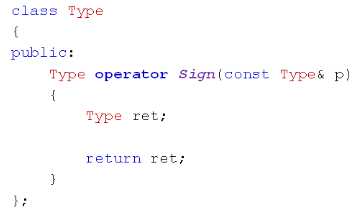
示例3——不使用友元,而是使用类的成员函数(编译器优先在成员函数中寻找操作符重载函数):
#include <stdio.h>
class Complex
{
int a;
int b;
public:
Complex(int a = 0, int b = 0)
{
this->a = a;
this->b = b;
}
int getA() { return a; }
int getB() { return b; }
Complex operator + (const Complex& p)
{
Complex ret;
printf("Complex operator + (const Complex& p)\n");
ret.a = this->a + p.a;
ret.b = this->b + p.b;
return ret;
}
friend Complex operator + (const Complex& p1, const Complex& p2);
};
Complex operator + (const Complex& p1, const Complex& p2)
{
Complex ret;
printf("Complex operator + (const Complex& p1, const Complex& p2)\n");
ret.a = p1.a + p2.a;
ret.b = p1.b + p2.b;
return ret;
}
int main()
{
Complex c1(1, 2);
Complex c2(3, 4);
Complex c3 = c1 + c2; // c1.operator + (c2)
printf("c3.a = %d, c3.b = %d\n", c3.getA(), c3.getB());
return 0;
}运行结果为:
[root@bogon Desktop]# g++ test.cpp
[root@bogon Desktop]# ./a.out
Complex operator + (const Complex& p)
c3.a = 4, c3.b = 6复数类应该具有的操作:
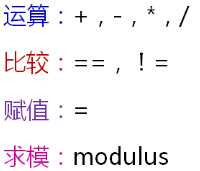
利用操作符重载:
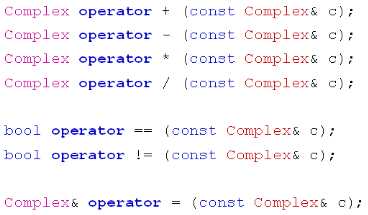
先实现Complex.h头文件:
// Complex.h
#ifndef _COMPLEX_H_
#define _COMPLEX_H_
class Complex
{
double a;
double b;
public:
Complex(double a = 0, double b = 0);
double getA();
double getB();
double getModulus();
Complex operator + (const Complex& c);
Complex operator - (const Complex& c);
Complex operator * (const Complex& c);
Complex operator / (const Complex& c);
bool operator == (const Complex& c);
bool operator != (const Complex& c);
Complex& operator = (const Complex& c);
};
#endif再实现Complex.cpp具体操作:
// Complex.cpp
#include "Complex.h"
#include "math.h"
Complex::Complex(double a, double b)
{
this->a = a;
this->b = b;
}
double Complex::getA()
{
return a;
}
double Complex::getB()
{
return b;
}
double Complex::getModulus()
{
return sqrt(a * a + b * b);
}
Complex Complex::operator + (const Complex& c)
{
double na = a + c.a;
double nb = b + c.b;
Complex ret(na, nb);
return ret;
}
Complex Complex::operator - (const Complex& c)
{
double na = a - c.a;
double nb = b - c.b;
Complex ret(na, nb);
return ret;
}
Complex Complex::operator * (const Complex& c)
{
double na = a * c.a - b * c.b;
double nb = a * c.b + b * c.a;
Complex ret(na, nb);
return ret;
}
Complex Complex::operator / (const Complex& c)
{
double cm = c.a * c.a + c.b * c.b;
double na = (a * c.a + b * c.b) / cm;
double nb = (b * c.a - a * c.b) / cm;
Complex ret(na, nb);
return ret;
}
bool Complex::operator == (const Complex& c)
{
return (a == c.a) && (b == c.b);
}
bool Complex::operator != (const Complex& c)
{
return !(*this == c);
}
Complex& Complex::operator = (const Complex& c)
{
if( this != &c )
{
a = c.a;
b = c.b;
}
return *this;
}最后实现main函数:
// test.cpp
#include <stdio.h>
#include "Complex.h"
int main()
{
Complex c1(1, 2);
Complex c2(3, 6);
Complex c3 = c2 - c1;
Complex c4 = c1 * c3;
Complex c5 = c2 / c1;
printf("c3.a = %f, c3.b = %f\n", c3.getA(), c3.getB());
printf("c4.a = %f, c4.b = %f\n", c4.getA(), c4.getB());
printf("c5.a = %f, c5.b = %f\n", c5.getA(), c5.getB());
Complex c6(2, 4);
printf("c3 == c6 : %d\n", c3 == c6);
printf("c3 != c4 : %d\n", c3 != c4);
(c3 = c2) = c1;
printf("c1.a = %f, c1.b = %f\n", c1.getA(), c1.getB());
printf("c2.a = %f, c2.b = %f\n", c2.getA(), c2.getB());
printf("c3.a = %f, c3.b = %f\n", c3.getA(), c3.getB());
return 0;
}运行结果为:
[root@bogon Desktop]# g++ test.cpp Complex.cpp
[root@bogon Desktop]# ./a.out
c3.a = 2.000000, c3.b = 4.000000
c4.a = -6.000000, c4.b = 8.000000
c5.a = 3.000000, c5.b = 0.000000
c3 == c6 : 1
c3 != c4 : 1
c1.a = 1.000000, c1.b = 2.000000
c2.a = 3.000000, c2.b = 6.000000
c3.a = 1.000000, c3.b = 2.000000注意事项:
标签:row tor 赋值操作符 des col roo 完成 desktop main函数
原文地址:https://www.cnblogs.com/PyLearn/p/10084115.html